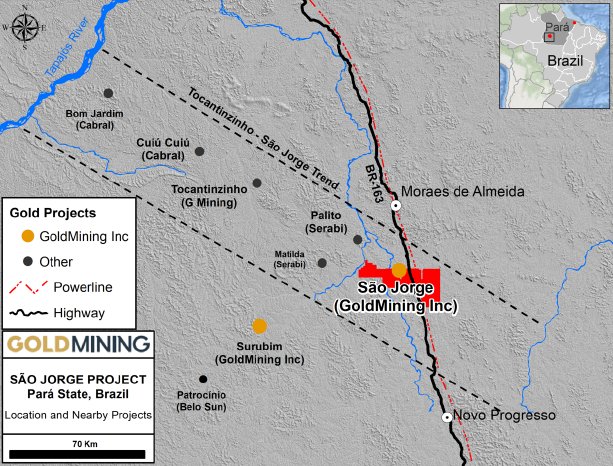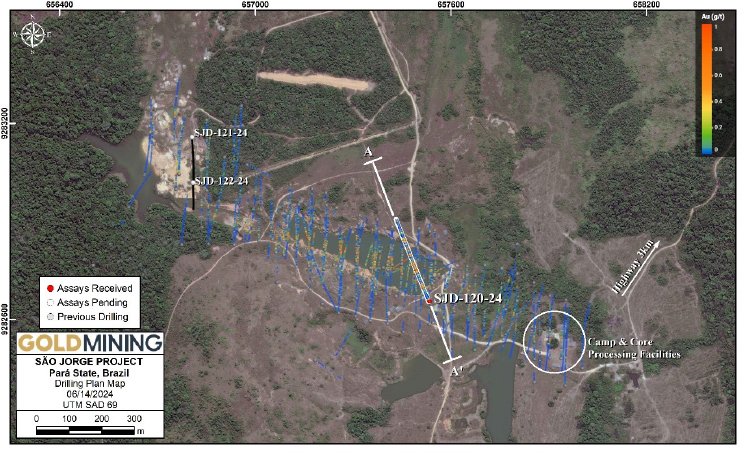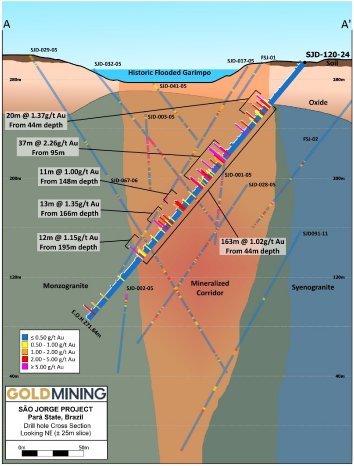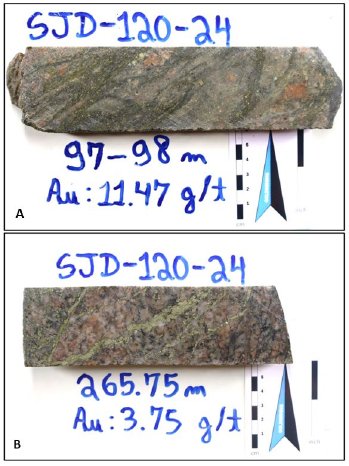The program consists of approximately 1,000 metres ("m") of total proposed diamond core drilling and 3,000 m of power auger drilling. The objectives of the program include, among other things, to complete confirmatory drilling within and near the margins of the existing São Jorge gold deposit1 (the "Deposit"), and test a reinterpretation of the structural controls on high-grade mineralization. Assay results for the first diamond drill hole have been received and are reported in this release.
Drill Hole SJD-120-24 highlights include:
- 163 m at 1.02 grams per tonne (g/t) gold (Au) from 44 m downhole depth, including higher-grade intersections:
- 20 m at 1.37 g/t Au from 44 m depth;
- 37 m at 2.26 g/t Au from 95 m depth;
- 11 m at 1.00 g/t Au from 148 m depth;
- 13 m at 1.35 g/t Au from 166 m depth; and
- 12 m at 1.15 g/t Au from 195 m depth.
Drill Program Details and Geological Description
São Jorge sits within the active and rapidly developing Tapajós Gold District (see Figure 1), which is estimated to have produced over 20 million ounces of gold historically from artisanal mining of surface deposits, according to the Brazil National Mining Agency. The Tapajós is home to Serabi Gold Plc.’s producing high-grade underground Palito Mine and G Mining Ventures Corp.’s ("G Mining") brand new Tocantinzinho open pit mine, which recently commenced commissioning of its ore processing facility (see G Mining news release June 11, 2024).
São Jorge is located immediately adjacent to paved Hwy BR-163 and a new 138 kV powerline corridor tied into the district electrical grid recently constructed for Tocantinzinho. Exploration activities at São Jorge are operated from a permanent camp adjacent to the existing Deposit and just 3 kilometres from the highway.
The Company commenced drilling at São Jorge in May 2024 (see news release dated May 29, 2024). Structural analysis of historic mapping and oriented core from drilling by previous operators identified two principal vein/fracture orientations, the intersection of which produces a steeply plunging high-grade ‘shoot’ geometry. To test this interpretation, three infill (confirmatory) oriented core drill holes are planned within the known Deposit and near its margins (see Figure 2). This drilling, including results of the first hole contained in this news release could provide evidence for a better understanding of the controls on high-grade mineralization and optimization of the resource modelling methodology.
SJD-120-24 intersected numerous zones of gold mineralization starting in the saprolite zone near the surface and extending into bedrock (see Figure 3). Mineralization comprises fracture-controlled sulphide ± quartz veins, with the sulphides consisting of dominant pyrite with lesser chalcopyrite, along metre-scale northwest-southeast striking shear zones hosted within monzogranite and along a sheared footwall contact between monzogranite and syenogranite, which cumulatively defines the São Jorge high-strain corridor. Pyrite occurs as hairline stringers, disseminated grains and semi-massive pyrite in 3 – 5 cm thick veins. Better gold grades are related to a higher abundance of sulphide minerals, particularly thicker veins, and/or a higher density of semi-massive to massive pyrite veins. Figure 4 illustrates the strong visual nature of mineralization at São Jorge.
Qualified Person
Paulo Pereira, P. Geo., President of GoldMining, has supervised the preparation of, and verified and approved, the scientific and technical information herein this news release. Mr. Pereira is a Qualified Person as defined in National Instrument 43-101 – Standards of Disclosure for Mineral Projects (“NI 43-101”).
Data Verification
For this drill core sampling program, samples were taken from the NQ/HQ core by sawing the drill core in half, with one-half sent to SGS Geosol Laboratórios Ltda. ("SGS") in Brazil for assaying, and the other half of the core retained at the site for future reference. Sample lengths downhole were uniformly 1.0 m. SGS is a certified commercial laboratory in Vespasiano, Minas Gerais, Brazil, and is independent of GoldMining. GoldMining has implemented a quality assurance and quality control program for the sampling and analysis of drill core, including duplicates, mineralized standards and blank samples for each batch of 100 samples. The gold analyses were completed by FAA505 method (fire-assay with an atomic absorption finish on 50 grams of material).
About GoldMining Inc.
GoldMining Inc. is a public mineral exploration company focused on acquiring and developing gold assets in the Americas. Through its disciplined acquisition strategy, GoldMining now controls a diversified portfolio of resource-stage gold and gold-copper projects in Canada, the U.S.A., Brazil, Colombia, and Peru. The Company also owns approximately 21.5 million shares of Gold Royalty Corp. (NYSE American: GROY), 9.9 million shares of U.S. GoldMining Inc. (Nasdaq: USGO), and 26.7 million shares of NevGold Corp. (TSXV: NAU). See www.goldmining.com for additional information.
Cautionary Statement on Forward-looking Statements
Certain of the information contained in this news release constitutes “forward-looking information” and “forward-looking statements” within the meaning of applicable Canadian and U.S. securities laws (“forward-looking statements”), which involve known and unknown risks, uncertainties and other factors that may cause the Company’s actual results, performance and achievements to be materially different from the results, performance or achievements expressed or implied therein. Forward-looking statements, which are all statements other than statements of historical fact, include, but are not limited to, statements and expectations respecting the proposed drill program at the Project; , including the potential benefits thereof and the Company's expectations regarding the Project. Any statements or information that express or involve discussions with respect to predictions, expectations, beliefs, plans, projections, objectives, assumptions or future events or performance (often, but not always, using words or phrases such as “expects”, “is expected”, “anticipates”, “believes”, “plans”, “projects”, “estimates”, “assumes”, “intends”, “strategies”, “targets”, “goals”, “forecasts”, “objectives”, “budgets”, “schedules”, “potential” or variations thereof or stating that certain actions, events or results “may”, “could”, “would”, “might” or “will” be taken, occur or be achieved, or the negative of any of these terms and similar expressions) are not statements of historical fact and may be forward-looking statements or information. Forward-looking statements are based on the then-current expectations, beliefs, assumptions, estimates and forecasts about the business and the markets in which GoldMining operates. Investors are cautioned that all forward-looking statements involve risks and uncertainties, including: the inherent risks involved in the exploration and development of mineral properties, fluctuating metal prices, unanticipated costs and expenses, risks related to government and environmental regulation, social, permitting and licensing matters, any inability to complete the drill program as expected, the Company’s plans with respect to São Jorge may change as a result of further planning or otherwise, and uncertainties relating to the availability and costs of financing needed in the future. These risks, as well as others, including those set forth in GoldMiningꞌs Annual Information Form for the year ended November 30, 2023, and other filings with Canadian securities regulators and the SEC, could cause actual results and events to vary significantly. Accordingly, readers should not place undue reliance on forward-looking statements. There can be no assurance that forward-looking statements, or the material factors or assumptions used to develop such forward-looking statements, will prove to be accurate. The Company does not undertake to update any forward-looking statements, except in accordance with applicable securities law.
1Additional information regarding the São Jorge Project, including existing resource estimates and historical work at the project, is set out in the technical report titled “São Jorge Gold Project, Pará State, Brazil: Independent Technical Report on Mineral Resources”, prepared for the Company and dated effective May 31, 2021, which is available under the Company’s profile at www.sedarplus.ca.





